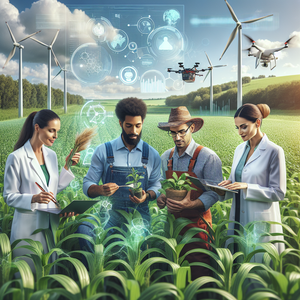
Exploring Careers in Agriculture: Paving the Way for a Sustainable Future
The agricultural landscape is shifting dramatically, opening up a wealth of career paths that extend well beyond the traditional image of farming. This transformation is fueled by advancements in technology, a heightened focus on sustainability, and innovative methods of food production and resource management.
Job Summaries:
Agricultural Engineer:
- These professionals blend engineering principles with agricultural practices to design machinery.
- They develop bioenergy systems.
- They promote sustainable farming.
- A bachelor’s degree in agricultural engineering or a similar field is typically required.
- Strong analytical and software skills are needed.
- Their work is pivotal in enhancing efficiency and tackling global food security challenges.
Agricultural Economist:
- Analyzing economic trends that impact agriculture, agricultural economists help businesses make informed decisions.
- Often working for research institutions or agribusinesses, they employ statistical tools to forecast market conditions.
- A master’s degree is usually necessary, along with top-notch quantitative abilities.
Agronomist:
- Known as the 'crop doctors,' agronomists enhance crop yield and health through expert soil and pest management.
- They conduct field trials and research to identify best practices.
- A bachelor’s or advanced degree in agronomy or plant science is typically required, along with strong analytical skills.
Soil Scientist:
- These specialists examine soil properties and their relationship with plant growth, aiming to boost agricultural productivity.
- They conduct soil surveys and research sustainable management practices.
- A degree in soil science or a related field is essential, complemented by strong analytical skills.
Animal Nutritionist:
- Focusing on the dietary needs of livestock, animal nutritionists create plans that optimize health and productivity.
- They assess feed ingredients and conduct research to formulate balanced rations.
- A degree in animal science or nutrition is essential, along with a solid understanding of animal biology.
Aquaculturist:
- Aquaculturists oversee the cultivation of aquatic organisms such as fish and shellfish.
- They manage breeding, feeding, and health protocols.
- A degree in aquaculture or marine biology is required.
Farm Manager:
- Responsible for the overall operation of farms
- Farm managers optimize production and resource management
- Duties include staff supervision, budgeting, and implementing agricultural practices
- A degree in agricultural science or farm management is often required.
Pest Control Worker:
- These workers manage pests threatening crops and livestock
- Utilizing strategies that minimize damage while following safety regulations
- A high school diploma and on-the-job training are usually sufficient
- Some positions may require certification
Food Scientist:
- Food scientists focus on food processing and preservation techniques to ensure safety and quality.
- They develop new food products and enhance existing ones.
- A degree in food science is required, along with strong research capabilities.
Agricultural Technician:
- Supporting scientists and engineers in research
- Agricultural technicians collect samples and analyze data
- An associate degree in agricultural technology is typically necessary.
Veterinary Technician:
- Veterinary technicians support veterinarians in caring for livestock and pets through health assessments and treatment administration.
- An associate degree in veterinary technology is usually required.
Agricultural Marketing Specialist:
- These specialists devise strategies to promote agricultural products.
- Analyzing market trends and consumer preferences.
- A bachelor’s degree in marketing or agriculture is usually necessary.
Crop Consultant:
- Offering expert advice on crop management
- Pest control
- Soil health
- Conduct assessments
- Recommend best practices
- A degree in agronomy or plant science is typically required.
Environmental Scientist:
- Environmental scientists evaluate the impact of agricultural practices on the environment.
- Recommending sustainable methods to mitigate negative effects.
- A degree in environmental science is essential.
Agricultural Policy Analyst:
- These analysts research and evaluate policies affecting agriculture, offering recommendations to lawmakers.
- A degree in agricultural economics or public policy is typically required.
Precision Agriculture Specialist:
- Using technology and data analysis, these specialists enhance farming efficiency through GPS mapping and data collection techniques.
- A degree in agricultural engineering or a related field is often required.
Biochemist:
- Biochemists study the chemical processes within agricultural products.
- They focus on improving crop resilience.
- A doctorate in biochemistry or a related field is typically required.
Wildlife Biologist:
- Focusing on animal populations and habitats
- Wildlife biologists often engage in conservation efforts that intersect with agriculture
- A degree in wildlife biology or ecology is typically required.
Ranch Manager:
- Ranch managers oversee livestock operations.
- Managing staff and ensuring animal welfare.
- They handle budgeting and resource management.
- A degree in animal science or ranch management is often required.
Greenhouse Manager:
- Greenhouse managers supervise plant production and staff within greenhouse environments.
- They ensure optimal growth conditions.
- They implement pest control measures.
- A degree in horticulture or plant science is typically required.
The evolution of agriculture is creating a diverse range of career opportunities, driven by a commitment to sustainability and technological innovation. Whether you're drawn to hands-on roles or strategic positions in agribusiness, the agricultural sector offers numerous avenues for growth and creativity.
Explore More Jobs

